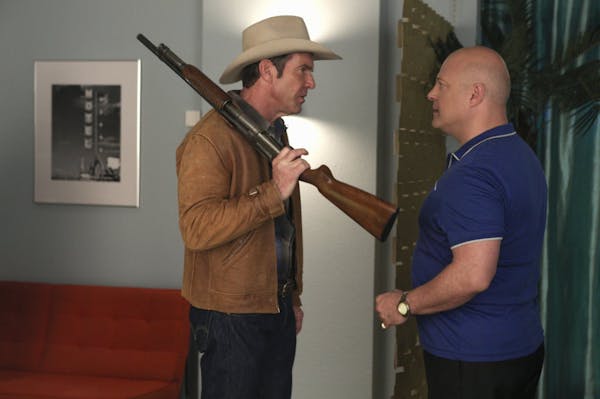NBC, the network that brought you "St. Elsewhere," "Seinfeld" and "30 Rock," now proudly presents ... an adorable monkey.
"Animal Practice," one of the most heavily promoted sitcoms of the fall, might not be groundbreaking television -- and that's just fine with the network.
As broadcast ratings continue to erode, programmers are retreating from the kind of edgy, prestigious shows they could boast about at cocktail parties. Instead, they're turning to tame, traditional fare such as "Practice," a fairly typical medical sitcom about a misanthropic veterinarian in which animals play a more prominent role than humans.
These programs are unlikely to change television, but networks hope they will keep viewers from changing the channel.
The newest members of the bland-wagon rely on familiar premises: A beleaguered single mom tries to make it after all (ABC's "Malibu Country"); a hot, plucky lawyer bucks the odds (CBS's "Made in Jersey"); a sarcastic loner learns how to win friends and influence people (NBC's "Go On").
The most egregious sin is the blatant attempt to copy the "Modern Family" formula, which is all about appealing to all ages. No fewer than five upcoming sitcoms, including "The Family Tools" and "The New Normal," center on multigenerational relationships with generous story lines for both grown-up and younger characters.
"You want there to be something for everybody," said Tim Doyle, an executive producer for "Malibu Country" and Tim Allen's "Last Man Standing," another sitcom on ABC. "It's tricky, but the intention is to draw the whole family to the TV."
It didn't use to be this way.
When the chips were down, networks used to take chances. It was a desperate ABC that bet on "Desperate Housewives" eight years ago. A generation earlier, NBC was having the ratings blues when it enlisted "Hill Street Blues."
Some insiders expected NBC would employ a similar strategy when it tried to recover from its disastrous Jay-Leno-in-prime-time experiment by hiring cable wizard Robert Greenblatt last year to run the then-fourth-place network. During his stint at Showtime, Greenblatt developed "Weeds," "Dexter" and "The Tudors," shows that walked on the wild side.
Instead, the executive has approached his new post with safety goggles on.
He announced that upcoming seasons of "The Office" and "30 Rock," two of TV's most critically acclaimed shows, would be their last. "Community," network TV's most unpredictable sitcom, is moving to Friday's graveyard shift.
Giving regard to broad ways
The shows that Greenblatt champions now may draw viewers, but they're unlikely to wind up on anyone's top 10 list.
"What we're trying to do with our comedy programming is broaden the audience and broaden what the network does," he said. "Those Thursday comedies, which the critics love and we love, tend to be a bit more narrow [in audience appeal] than we'd ultimately like to see as we move forward."
Shows that don't play to the masses have become the province of cable, where subscription fees help keep the lights on. They don't need huge numbers, as long as they keep paying the bills.
"We're trying to reach 30 million customers, all of whom have different passions and priorities," said Richard Plepler, co-president of HBO. "Game of Thrones," for example, plays to fervid fans of the fantasy genre, while "Girls" is tailor-made for younger viewers, and those who like their comedy to teeter on the edge. "We've got the luxury of programming to smaller niches in that audience because we're not trying to satisfy the largest group. We're trying to produce quality across all those demos [demographic groups] and all of those genres."
Playing to the masses
It should be noted that on those rare occasions when networks try to do a "cable-like" series, audiences haven't been terribly supportive. "Smash," Greenblatt's one-and-only gamble, opened to boffo ratings, but the show sputtered and its executive producer has been replaced. "Mad Men"-inspired period pieces such as NBC's "The Playboy Club" and ABC's "Pan Am" quickly ran out of fuel.
"The cable viewer is looking for something different, but the network viewer wants something with mass appeal," said Amy Parsons, media events supervisor for Campbell Mithun, the Minneapolis-based advertising and media consulting firm. "Networks -- how do I say this without sounding horrible? -- have to play to a lower common denominator."
Playing broad doesn't always mean playing dumb. CBS' "Everybody Loves Raymond" was about as traditional as you get, but it set a standard for smart dialogue and well-developed characters. NBC's "ER," on paper, was just another medical series, but its unrelenting pace and gritty story lines made it electric.
But those are the exceptions, especially when it comes time to handing out Emmys. For the first time in the history of television's top honors, none of this year's nominees for best drama is on a broadcast network.
Is there any chance that this fall's new shows will make that list in 2013? Possibly. ABC's "Last Resort," a big-budget thriller with Andre Braugher trying to prevent nuclear war, has great potential. CBS' "Vegas," which marks the series debut of Dennis Quaid, is rich in action and plot.
But quality shows take time to develop, and networks are impatient. According to Campbell Mithun, 29 of the 45 shows that debuted last season were not renewed, a 64 percent failure rate. That actually isn't bad, considering the failure rate has averaged about 70 percent over the past decade, according to TheFutonCritic.com, a website that monitors prime-time TV.
The only network not suffering in this new era of scripted television is CBS. Its formula of relying on such standard crime procedurals as "The Mentalist" and "CSI," which don't require dedicated viewing or heavy thinking, has kept it the most-watched network, a title it's held since 2002-03.
CBS has proven that playing it safe works -- and that's bad news for those who crave quality TV on the free airwaves.
njustin@startribune.com • 612-673-7431 • Twitter: @nealjustin

Neal Justin: Why Conan O'Brien is a national treasure

TV review: 'Jane' is the best heroine for families prepping for Earth Day

CBS will turn the lights back on for Billy Joel concert

TV to watch: Billy Joel offers concert for those of us who aren't big shots


